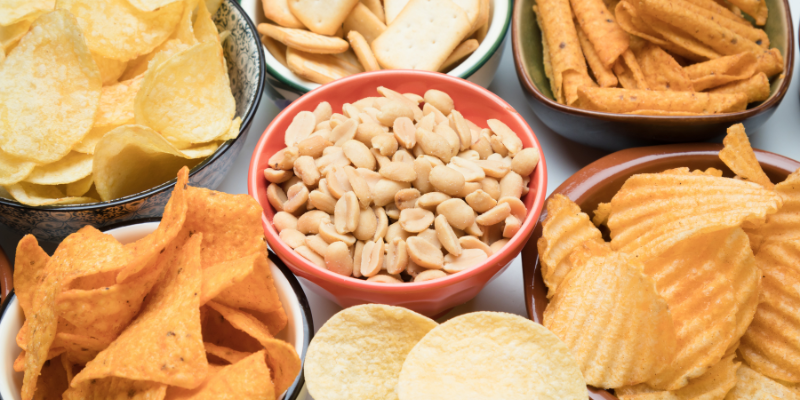Advertisement
Why You Are Gaining Weight without Even Consuming Bad Foods and a Lot of Snacking
Oct 15, 2024 By Celia Shatzman
There can come a time when you feel terrible about yourself, and it's due to weight gain. So, are you gaining weight even though you avoid consuming bad foods and do not snack much? If you ever find yourself thinking, "Am I gaining weight even though I do not eat bad foods or snacks a lot?" then be assured that you are certainly not alone. Most people find themselves in the same position as you: confused regarding excess pounds even when they feel they're doing everything right. The bottom line, however, is that the rise in body fat entirely depends on factors other than what we eat. This article shall explain why this is so and shall proceed to elaborate further on the various reasons for weight gain, even after our best endeavors at avoiding junky foods or snacks.
Common Misconceptions about Weight Gain
Calories In vs. Calories Out
Most research studies equate not consuming "bad" foods with not gaining weight. However, maintaining, losing, or gaining weight is quite complex. Weight gain or loss can be reduced to the most fundamental principle: "calories in versus calories out." Even when people consume healthy foodstuffs, they will gain weight if their calorie input exceeds their output.
Healthy fresh fruits, vegetables, whole grains, and many more contain calories. Though they'll benefit your body nutritionally, if you consume them in enormous portions, they'll weigh you down. For example, though nutritious for your body, vast portions of nuts, seeds, and oils will exceed the calorie line.

Control portion with healthy foods
Most of them make the mistake of overindulging in healthy foods because they are wholesome. Of course, nutritious foods will nutritionally be superior to junk foods, but they also add up your overall calorie count; portion control should always be a relevant factor as far as weight management is concerned, regardless of how healthy food might be. Some collect what one considers to be healthier stocks such as nuts, avocados, or whole grains; these, too, have their excessive indulgence leads to weight gain.
Risk Factors for Weight Gain
Metabolism and Body Composition
Basal Metabolic Rate (BMR): This is the number of calories the body burns at rest, which are burned in performing the body's essential functions, including breathing and digestion. Some individuals have naturally lower or lower BMR due to genetics, age, or other reasons, burning fewer calories even from healthy food consumed.
- Muscle vs. Fat: If you have lost muscle mass, your metabolism drops because muscles burn many more calories than fat. The same diet, which never seemed to add an ounce of an inch, suddenly makes you fatter.
Hormonal differences
Imbalanced hormones also lead to a case of unknown weight gain. Some conditions will result in excessive fat storage in your body or alter metabolism.
- Hypothyroidism This is the condition where your thyroid gland fails to produce sufficient hormones that regulate your metabolism. Due to this, it will make you gain weight even when you are eating healthy since your metabolism has been slowed down.
- Insulin Resistance: Excess fat around your midsection accumulates more when your body is ineffective at using insulin.
Lifestyle Factors
Exercise
Diet and exercise share an equation for weight management. Assuming one is exercising the right foods but burning fewer calories because of minimal workouts leads to weight gain. Those sitting for long hours or hardly moving around have a slowed metabolic rate since a sedentary lifestyle contributes to weight gain.
Proper exercises are to be undertaken to either gain or lose weight, and that could be cardio, strength building, or just a casual walk. These increase the metabolic rate and remove extra weight.
Stress and sleep
Stress: This is a critical function that stress plays in weight gain. Over time, over-stimulation of cortisol increases appetite and, more likely than not, enables you to overindulge in high-calorie comfort foods. Even if your meals are healthy, they might push you into snacking or emotional eating, leading to weight gain.
If you do not sleep well, your body cannot control your hunger and fullness hormones, such as ghrelin and leptin. The result is an increase in ghrelin, the hunger hormone, and a reduction in leptin, the feel-full hormone; you tend to be hungry without any regard to your nutritional level. This will make you indulge even the quality of your food intake.
Fluid Retention Role
Not all weight gain is caused by fat. Sometimes, water may cause temporary weight gain. Fluid overload results when an excess amount of fluid is collected in the body, usually through excessive salt and water intake, or it may be caused by dehydration and hormonal shifts. It may not be permanent weight gain, but the scale will undoubtedly go up, and it is so frustrating that you are trying to lose or hold on to your weight.
Salt Intake
Too much salt causes water retention. In a completely different sense, it makes you puffed up and heavier than you are. Although actual weight gain in terms of fat will not be found in this case, it does create temporary fluctuations in your weight.
Hormonal Changes That Bring About Water Retention
However, hormonal fluctuations, especially in females, cause edema, which is greatly connected to a woman's menstrual cycle. This will probably result in some temporary weight gain, but most fluctuations of body mass based on hormones should return to normal as these fluctuations themselves dissipate.

Monitoring Your Progress
Food Diary
By keeping a food diary, you will learn about your eating habits. It is recording everything that you eat and drink over the course of a day. You might have undeclared calories or overeat healthy foods that you never noticed before. As soon as you become conscious, you can refine your diet to avoid unnecessary weight gain.
Regular Weighing
You may also notice weight swings over a few days if you weigh daily. By weighing one day and then again the next day, your weight could have changed a pound or two. In that respect, such fluctuations wouldn't accurately measure your long-term patterns. Try weighing once a week under the same conditions to get a clearer view of what is happening.
Seeking Professional Help
If you feel the same way and do not know why you will gain weight yet avoid bad food, you can talk to a professional healthcare provider or registered dietitian. He or she will define any possible reasons for health conditions and recommend healthy lifestyle changes, as well as guide you on the proper way to lose weight in balance.
Conclusion
It can be pretty frustrating, especially with the marginalization of harmful foods and snacks, but there are many reasons why a person goes through such weight cycling. One needs to understand one's body's metabolism, keep track of aspects like exercise, stress, and sleeping, and, if necessary, seek advice from the right experts. It is more about finding a kind of relationship that is aesthetically pleasing, balanced, and long-term rather than a relationship with food.







